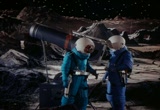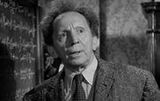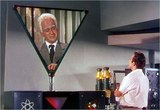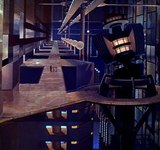1950s
Destination Moon (1950)
 Sometimes it's referred to as a 'hard SF' movie for its portrayal of a mission to the moon by plausible scientific theory and by business/engineering know how. Symbolizes its moon landing as a claim on the moon for all mankind, and has lighthearted moments with a Woody Woodpecker cartoon to demonstrate space flight.
Sometimes it's referred to as a 'hard SF' movie for its portrayal of a mission to the moon by plausible scientific theory and by business/engineering know how. Symbolizes its moon landing as a claim on the moon for all mankind, and has lighthearted moments with a Woody Woodpecker cartoon to demonstrate space flight.
It also depicts a semi-modern rocket launch and a differential analyzer (an actual mechanical computer from the 50s), along with radar and ship navigation electronics, scientific equipment to investigate the moon (telescope, Geiger counter), and communications between astronauts on the moon and reporters on earth.
Starring: John Archer, Warner Anderson, Tom Powers. Screenplay by SF guru Robert Heinlein, Alford Van Ronkel, James O'Hanlon. Produced by George Pal. Directed by Irving Pichel.
Sources: IMDb | RT | MRQE | Wikipedia
The Day the Earth Stood Still (1951)
 A Martian (Klaatu) comes to earth with a message of peace, but displays his love for peace by use of robotic force. Includes the traditional flying saucer, a ray gun effect, and a cool guardian robot.
A Martian (Klaatu) comes to earth with a message of peace, but displays his love for peace by use of robotic force. Includes the traditional flying saucer, a ray gun effect, and a cool guardian robot.
I was surprised how forceful and noble this movie is since a quick glance at a summary makes the movie seem superficial, but the full idea of the robot (Gort) is fascinating and also the high esteem held for scientists (such as portraying an Einstein-like scientist and having Klaatu discuss science with an excited human child).
However, the film's emphasis on peace turns earth scientists into ultimate diplomats as if they can magically end disputes between divided and warring nations. Perhaps it would be better to teach the scientists to use the guardian robot!
B&W. Starring: Michael Rennie, Patricia Neal, Hugh Marlowe, Sam Jaffe. Based on a story by Harry Bates: Farewell to the Master. Directed by Robert Wise.
Sources: IMDb | RT | MRQE | Wikipedia | Script | Google Directory
The Thing From Another World (1951)
A highly complex vegetable is found to be intelligent (by reflex alone) and zombie-like (it lacks consciousness and ethical values). It crash lands, thaws out, and begins to colonize Earth and feast on humans as a secretive scientist experiments with it. Lacks follow through and detail on the alien's mission, and the intelligent zombie-plant creature doesn't seem very likely!
B&W. Starring: Margaret Sheridan, Kenneth Tobey, Robert Cornthwaite, Douglas Spencer, James Young. Based on the masterpiece by John W. Campbell: Who Goes There?. Produced by Howard Hawks. Directed by Christian Nyby.
Sources: IMDb | RT | MRQE | Wikipedia.
When Worlds Collide (1951)
A pair of astronomers calculate a massive threat to earth (using telescopes and a differential analyzer), and (with a rich financier) make plans to build an ark with 44 people, microfilms of our knowledge, and many animals. Can they flee to a new world in time against the law of the jungle and general panic?
Starring: Richard Derr, Barbara Rush, Peter Hansen. Based on the novel by Philip Wylie and Edwin Balmer. Produced by George Pal. Directed by Rudolph Maté.
Sources: IMDb | RT | MRQE | Wikipedia
The Man in the White Suit (1952)
A comedy about a chemist who pushes science to the brink of a new valuable discovery, though, with bad side effects: textile capitalists and their workers might become extinct!
B&W. Starring: Alec Guinness. Based on the play by Roger MacDougall. Directed by Alexander Mackendrick.
Sources: IMDb | RT | MRQE | Wikipedia
Invaders From Mars (1953)
This British movie surveys flying saucer mystique, portrays a child-like love for discovery, and portrays an invading brain-in-a-vat creature and its assimilation of locals. The film's passion for science is a bit hindered by a flying saucer conspiracy vibe.
Starring: Helena Carter, Arthur Franz, Jimmy Hunt. Directed by William Menzies.
Sources: IMDb | RT | MRQE | Wikipedia
The War of the Worlds (1953)
The ultimate classic alien invasion movie in which the aliens treat us as lower life forms, best left destroyed! The special effects were good at the time, but now look outdated. The George Pal production has some non-Wellsian themes, but overall I think it's currently the best version.
Starring: Gene Barry, Ann Robinson. Based on the novel by H. G. Wells. Produced by George Pal. Directed by Byron Haskin.
Sources: IMDb | RT | MRQE | Wikipedia | Google Directory
Conquest of Space (1955)
In stark contrast to NASA inspired SF of the 60s ("Robinson Crusoe on Mars", "2001: A Space Odyssey"), 'Conquest' has a personality rich crew of space sick and female deprived guys. Six volunteer for special training and risky space missions, such as building both a (circular rotating) space station and a deep-space shuttle. The idea was that we would need a space station from which to build space shuttles that would be sufficient to get to Mars.
The crew experiences psychological difficulties adapting to extended life in space. For the commander, Samuel T. Merritt, the mission to Mars is pointless (and he's not afraid to say so). Another crew member, Imoto (the geologist), saw it as vital for replenishing earth's resources. Imoto is Japanese and comments that his people are especially desperate for additional resources (he oddly argues to look at how small they are and how they use wooden utensils!).
After encounters with dangerous space debris and melodrama about whether humans ought to leave a God designed earth for foreign worlds, we get beautiful artwork of space and the surface of Mars. Scientific realism is evident in many little details (follows "Destination Moon" by having astronauts exit the shuttle to make repairs, mostly attentive to micro gravity in space and to the time lag of communications across space). The final message is heroic and somewhat unexpected; man perhaps overcomes his inhibitions and shows promise to 'conquer space'.
Starring: Walter Brooke, Eric Fleming, Mickey Shaughnessy, Phil Foster, William Redfield, William Hopper, Benson Fong, Ross Martin, Andre Fodor. Based on the book illustrated by Chesley Bonestell and written by Willy Ley. Produced by George Pal. Directed by Byron Haskin.
Sources: IMDb | RT | MRQE | Wikipedia
This Island Earth (1955)
 An excellent concept of alien contact and the gathering of scientists to work on a task. The exotic aliens caught the attention of many back when the film was released. But the story doesn't hold my attention as well today. Mentions the miniaturization of technology and nuclear power.
An excellent concept of alien contact and the gathering of scientists to work on a task. The exotic aliens caught the attention of many back when the film was released. But the story doesn't hold my attention as well today. Mentions the miniaturization of technology and nuclear power.
Starring: Jeff Morrow, Faith Domergue, Rex Reason. Based on the serial by Raymond F. Jones. Directed by Joseph M. Newman.
Sources: IMDb | RT | MRQE | Wikipedia | Google Directory
Forbidden Planet (1956)
It is a movie rich in ideas as a Star Trek-like crew investigates a planet (Altair IV) and unknowingly run into a lot of trouble and a tempest (drawing from a Shakespearean theme). Has an advanced robot (Robby!), a machine for improving human intelligence , supercomputers for running an ancient alien civilization (the Krell), a hover craft, and semi-virtually projected creatures (or a dangerous materializing-Freudian-id!).
, supercomputers for running an ancient alien civilization (the Krell), a hover craft, and semi-virtually projected creatures (or a dangerous materializing-Freudian-id!).
Roddenberry says it influenced his vision of Star Trek; its influence is very obvious in the first aired episode of Star Trek: The Original Series ("The Man Trap", 1966).
Starring: Walter Pidgeon, Anne Francis, Leslie Nielsen. Directed by Fred Wilcox.
Sources: IMDb | RT | MRQE | Wikipedia | Google Directory | Transcript
Other 1950s SF and Related Movies
-
Quick mentions (future possible entries): The Beast from 20,000 Fathoms (Dir. Eugène Lourié, 1953), It Came from Outer Space (Dir. Jack Arnold, 1953), Gog (Dir. Herbert L. Strock, 1954), Them! (Dir. Gordon Douglas, 1954), Earth vs. the Flying Saucers (Dir. Fred F. Sears, 1956), Godzilla, King of the Monsters! (Dir. Ishirô Honda/Terry O. Morse, 1956), Kronos (Dir. Kurt Neumann, 1957), I Married a Monster from Outer Space (Dir. Gene Fowler Jr., 1958).
Home | Pre-1950s | 1950s | 1960s | 1970s | 1980s | 1990s | 2000s | A-Z List
 We are looking for people with skills or interest in the following areas:
We are looking for people with skills or interest in the following areas:
